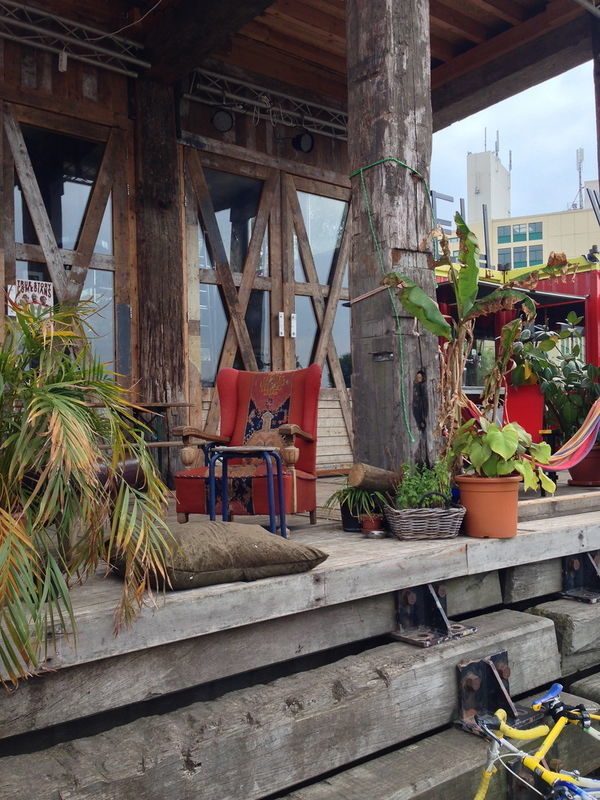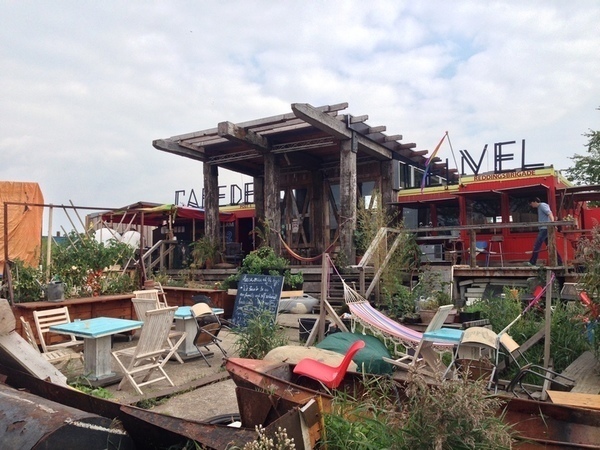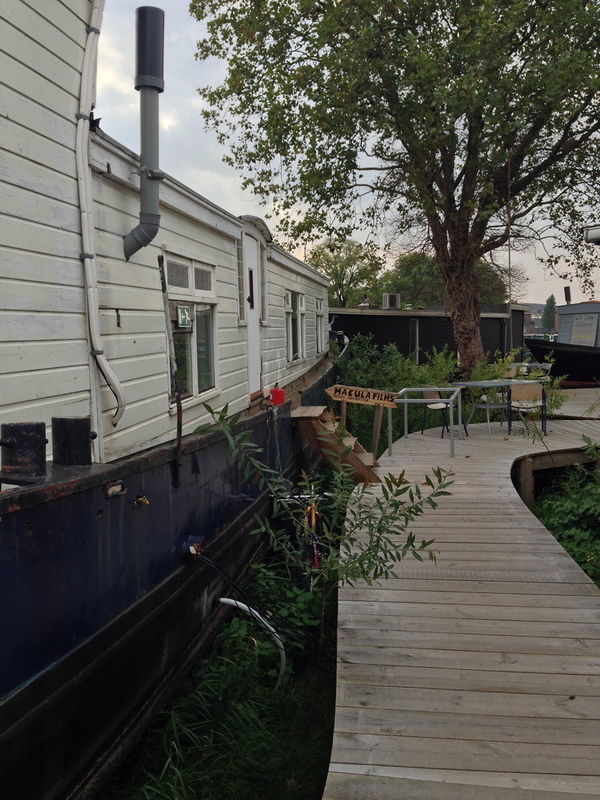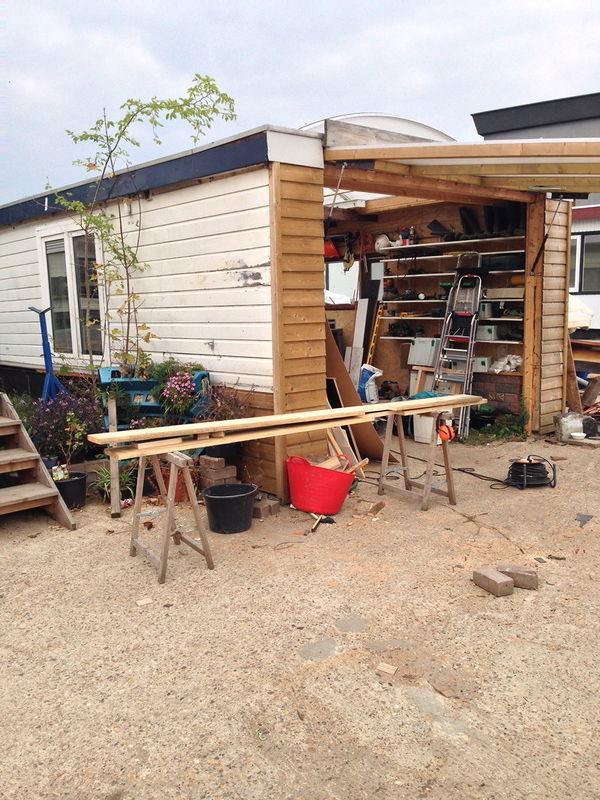Difference between revisions of "De Ceuvel"
Rümeysa Önal (talk | contribs) |
|||
| (21 intermediate revisions by 5 users not shown) | |||
| Line 1: | Line 1: | ||
| − | + | {{Article | |
| + | |Image=ceuvel1.jpg | ||
| + | |Caption=De Ceuvel | ||
| + | |Summary=Near the Van Hasselt canal and the IJ in Amsterdam-Noord, a former ship wharf now hosts a very special association of creative and social entrepreneurs called De Ceuvel. De Ceuvel is run by a group of architects, landscape architects, artists, photographers, designers, etc. who have an amazing approach that combines sustainability and social motives, stimulates the local economy (keeping transportation costs low) and proves to be a laboratory for (alternative) cultural, social and economic development in an autarkic and 'Do-It-Yourself' manner. The first inspiring results of this initiative are a self-sustaining café, an innovative approach to polluted soil, and the re-use of leftover houseboats. This is not just any kind of community; perhaps you will not find a place like this anywhere else in Europe that is as extensive as De Ceuvel. | ||
| + | |Article=== A self-sustaining café == | ||
| + | The café is the first thing that catches your eye on the site due to its robust architecture. The facade frame seems to be built from old harbour bollards. The entire café appears to be constructed completely from upcycled materials – referring back to the roots of the area, an old ship wharf in the harbour of Amsterdam. [http://www.cafedeceuvel.nl/ Café de Ceuvel] is already very popular with the people of Amsterdam for its good food. Real, healthy, pure and delicious food and as home-made as possible. The vegetables are bought from the nearby '''[http://www.5050-green.nl/locaties/7/ 50/50-green]''' garden. The sodas are home-made and the mushrooms are from Amsterdam urban farming. In the future it will also be possible to buy locally produced vegetables & Fairtrade coffee beans at the Café. | ||
| + | Besides serving food, Café de Ceuvel is also a knowledge sharing point about good food, through food events such as lectures, workshops and tastings. The cafe also seeks to provide a stage for art exhibitions, bands, theatre makers and filmmakers, as a true creative melting pot. | ||
| + | The building will be as self-sufficient as possible. For example it contains a digester that digests kitchen waste into gas, to be used again in the kitchen. | ||
| − | |||
| − | |||
| − | |||
| − | |||
| − | |||
| − | |||
| − | |||
| − | |||
| − | |||
| − | |||
[[File:ceuvel2.jpg|600px]] | [[File:ceuvel2.jpg|600px]] | ||
| − | + | Café de Ceuvel facade, pavilion designed by architect Wouter Valkenier | |
| − | pavilion designed by architect Wouter Valkenier | ||
| − | |||
| − | Due to the polluting activities of the shipping industry, the site is highly | + | == Purifying the soil == |
| + | Due to the polluting activities of the shipping industry, the site is highly contaminated by heavy metals and motor oil. Digging the dirty soil out is an intensive and expensive job. Therefore the creators joined forces with DELVA Landscape Architects in collaboration with the University of Ghent. They came up with an organic idea: purifying the soil by using phytoremediation techniques. 'Phyto' is Latin for plant and 'remediation' in this case means to restore balance: the balance of the soil is restored by plants that are able to absorb, degrade and break down the pollutants. It will probably take at least 30 years for the soil to be cleaned entirely. The plants themselves will be fermented in a biogas digester, which will be used for cooking and heating. | ||
| − | [[File:ceuvel4.jpg| | + | [[File:ceuvel4.jpg|600px]] |
| − | Space&matter and Metabolic Lab | + | '''[http://www.spaceandmatter.nl/ Space&matter]''' and '''[http://www.metaboliclab.nl/ Metabolic Lab]''' made the design and technical outfitting of the boat retrofits, together with construction foreman and boat expert Huib Koel. |
| − | |||
| − | |||
| − | |||
| − | |||
| + | == Upcycling == | ||
| + | The polluted soil means that it is not possible to install underground water or gas pipes, to connect to a sewer, or to build underground foundations. Therefore the creators are re-using depreciated houseboats from the canals of Amsterdam. Disposing of an old houseboat costs a lot of money for the owner. Also, most of the boats are still usable; they are simply leaking and are no thus no longer suitable for use on the water. Taking over the ownership is thus a win-win sustainable solution; waste is prevented, the owner is happy to be rid of the boat, and the houseboats are free of charge which keeps overall costs low. Also, once the 10-year lease comes to an end, the boats can be removed quickly and almost waste-free. Once ashore these houseboats are placed on frames above the ground. A wooden boardwalk connects the boats in an elegant way. It's like walking through a wetland. Right now De Ceuvel contains more than 15 houseboats, all of which accommodate the offices, studios and workshops of social and creative entrepreneurs. Just like Café de Ceuvel, the houseboats re-use water by filtering it through sand. For energy, the roofs are covered with solar panels. The public areas such as Café de Ceuvel and Bed & Breakfast are part of a future plan for becoming entirely self-sustainable by re-using water & energy. | ||
| − | + | [[File:ceuvelworkshop.jpg|600px]] | |
| − | |||
| − | |||
| − | [[File:ceuvelworkshop.jpg| | ||
A workshop at De Ceuvel | A workshop at De Ceuvel | ||
=== Creative incubator as try-out === | === Creative incubator as try-out === | ||
| − | The | + | The site has been leased for 10 years from the Municipality of Amsterdam. The lease has been running for almost one year now. The former industrial area is gradually being transformed into this unique urban development. Generally speaking, De Ceuvel is an innovative and large-scale initiative. The artists and designers, landscape architects and entrepreneurs of Cafe de Ceuvel together form the community De Ceuvel. Together they all contribute in their own way to keep this community running. The community functions as a test case for the participation society, in which everybody does their bit, and where the efforts of many volunteers and a 'shoulders to the wheel' mentality shows that it is indeed possible. To recognise the fact that power comes from sharing the knowledge obtained through this beautiful social, self-sustainable project. In this time of economic crisis, De Ceuvel teaches us that creative thinking and a well-organised and solid plan have a fair chance of making a change, for a better world of tomorrow. |
| − | |||
| − | |||
| − | |||
| − | |||
| − | |||
| − | |||
| − | + | === Discussion === | |
| − | + | ''The editorial board invites readers to reflect and react on the following question: After 10 years, the Municipality of Amsterdam will most likely reclaim this upcycled land and make good money out of it, leaving the initiators with nothing but a good experience and perhaps a new piece of waste land. The development of the Hilton DoubleTree hotel on the neighbouring NDSM Wharf seems to be a dramatic example of this gentrification mechanism. Do you have a concrete proposition or example of how to claim this added value for the creating pioneers?'' | |
| − | + | }} | |
| − | + | {{Category selector | |
| − | + | |Category=Bottom-up | |
| + | }} | ||
| + | {{Category selector | ||
| + | |Category=Circularity | ||
| + | }} | ||
| + | {{Category selector | ||
| + | |Category=Community | ||
| + | }} | ||
| + | {{Category selector | ||
| + | |Category=Spatial Design | ||
| + | }} | ||
| + | {{Category selector | ||
| + | |Category=Systems | ||
| + | }} | ||
| + | {{Category selector | ||
| + | |Category=Transformation | ||
| + | }} | ||
| + | {{Category selector | ||
| + | |Category=Urbanisation | ||
| + | }} | ||
| + | {{Category selector | ||
| + | |Category=Food | ||
| + | }} | ||
| + | {{Category selector | ||
| + | |Category=Sustainability | ||
| + | }} | ||
| + | {{Articles more}} | ||
Latest revision as of 11:49, 25 October 2018
A self-sustaining café
The café is the first thing that catches your eye on the site due to its robust architecture. The facade frame seems to be built from old harbour bollards. The entire café appears to be constructed completely from upcycled materials – referring back to the roots of the area, an old ship wharf in the harbour of Amsterdam. Café de Ceuvel is already very popular with the people of Amsterdam for its good food. Real, healthy, pure and delicious food and as home-made as possible. The vegetables are bought from the nearby 50/50-green garden. The sodas are home-made and the mushrooms are from Amsterdam urban farming. In the future it will also be possible to buy locally produced vegetables & Fairtrade coffee beans at the Café. Besides serving food, Café de Ceuvel is also a knowledge sharing point about good food, through food events such as lectures, workshops and tastings. The cafe also seeks to provide a stage for art exhibitions, bands, theatre makers and filmmakers, as a true creative melting pot. The building will be as self-sufficient as possible. For example it contains a digester that digests kitchen waste into gas, to be used again in the kitchen.
 Café de Ceuvel facade, pavilion designed by architect Wouter Valkenier
Café de Ceuvel facade, pavilion designed by architect Wouter Valkenier
Purifying the soil
Due to the polluting activities of the shipping industry, the site is highly contaminated by heavy metals and motor oil. Digging the dirty soil out is an intensive and expensive job. Therefore the creators joined forces with DELVA Landscape Architects in collaboration with the University of Ghent. They came up with an organic idea: purifying the soil by using phytoremediation techniques. 'Phyto' is Latin for plant and 'remediation' in this case means to restore balance: the balance of the soil is restored by plants that are able to absorb, degrade and break down the pollutants. It will probably take at least 30 years for the soil to be cleaned entirely. The plants themselves will be fermented in a biogas digester, which will be used for cooking and heating.
Space&matter and Metabolic Lab made the design and technical outfitting of the boat retrofits, together with construction foreman and boat expert Huib Koel.
Upcycling
The polluted soil means that it is not possible to install underground water or gas pipes, to connect to a sewer, or to build underground foundations. Therefore the creators are re-using depreciated houseboats from the canals of Amsterdam. Disposing of an old houseboat costs a lot of money for the owner. Also, most of the boats are still usable; they are simply leaking and are no thus no longer suitable for use on the water. Taking over the ownership is thus a win-win sustainable solution; waste is prevented, the owner is happy to be rid of the boat, and the houseboats are free of charge which keeps overall costs low. Also, once the 10-year lease comes to an end, the boats can be removed quickly and almost waste-free. Once ashore these houseboats are placed on frames above the ground. A wooden boardwalk connects the boats in an elegant way. It's like walking through a wetland. Right now De Ceuvel contains more than 15 houseboats, all of which accommodate the offices, studios and workshops of social and creative entrepreneurs. Just like Café de Ceuvel, the houseboats re-use water by filtering it through sand. For energy, the roofs are covered with solar panels. The public areas such as Café de Ceuvel and Bed & Breakfast are part of a future plan for becoming entirely self-sustainable by re-using water & energy.
A workshop at De Ceuvel
Creative incubator as try-out
The site has been leased for 10 years from the Municipality of Amsterdam. The lease has been running for almost one year now. The former industrial area is gradually being transformed into this unique urban development. Generally speaking, De Ceuvel is an innovative and large-scale initiative. The artists and designers, landscape architects and entrepreneurs of Cafe de Ceuvel together form the community De Ceuvel. Together they all contribute in their own way to keep this community running. The community functions as a test case for the participation society, in which everybody does their bit, and where the efforts of many volunteers and a 'shoulders to the wheel' mentality shows that it is indeed possible. To recognise the fact that power comes from sharing the knowledge obtained through this beautiful social, self-sustainable project. In this time of economic crisis, De Ceuvel teaches us that creative thinking and a well-organised and solid plan have a fair chance of making a change, for a better world of tomorrow.
Discussion
The editorial board invites readers to reflect and react on the following question: After 10 years, the Municipality of Amsterdam will most likely reclaim this upcycled land and make good money out of it, leaving the initiators with nothing but a good experience and perhaps a new piece of waste land. The development of the Hilton DoubleTree hotel on the neighbouring NDSM Wharf seems to be a dramatic example of this gentrification mechanism. Do you have a concrete proposition or example of how to claim this added value for the creating pioneers?Links
CONTRIBUTE
Feel free to contribute to Beyond Social.











